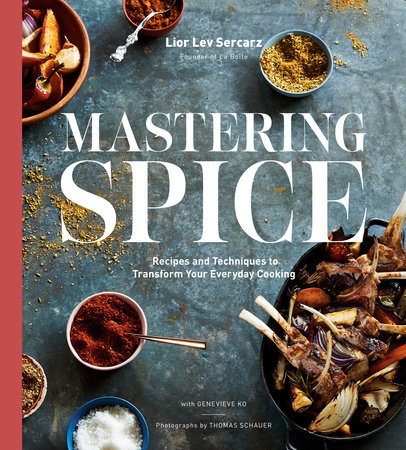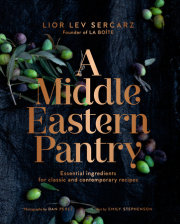NAMED ONE OF THE BEST COOKBOOKS OF THE YEAR BY THE NEW YORK TIMES BOOK REVIEW
Spices are the magic ingredient in Lior Lev Sercarz's newest book, Mastering Spice, and all it takes is a pinch to bring your meatballs, roast chicken, or brownies to the next level. Owner of New York City spice shop La Boîte, and a professionally trained chef who has cooked at some of the world's most renown restaurants, Lior's simple and straightforward approach showcases how spices and spice blends can take a recipe for chicken soup, meatballs, or brownies into a whole new and exciting direction. Every section begins with a master recipe and technique--then Lior teaches readers how to change the spices or some of the ingredients to get a profoundly different dish than what you began with. By mastering the techniques and playing with the variations, you'll learn how to use spices to become a more creative and intuitive cook, and how spices can endlessly heighten your eating experience.
“The Svengali of spice Lior Lev Sercarz is at it again! . . . The book showcases how the perfect spice blend can take straightforward recipes like chicken soup, meatballs, and brownies—yes, even brownies—from ordinary to sublime.”—Vogue
“Lior Lev Sercarz, the self-proclaimed ‘King of Spices,’ is a standout when it comes to seasoning: His spice blends have graced the kitchens of famous chefs and at-home cooks alike.”—CBS This Morning
“Having cooked at some of the world’s very best restaurants, Lior will have you mixing and matching your seasonings with ease to a seriously flavorsome result.”—Simon Said
My Story
My goal for this cookbook is simple: I want to show you how easy it is to transform everyday dishes just by adding and changing spices. It’s how I cook at home, after cooking as a professional chef for two decades. I rotate straightforward techniques that I’ve perfected over the years and change the spices and other add-ins for completely new dishes. Rather than swap methods for roasting vegetables or simmering beans, I simply switch the seasonings. This is a great way to learn how to cook: mastering basic techniques makes it easy to master new seasonings.
The dozens of techniques I’m going to teach you are ones that you can count on—always. They’re like master recipes; they offer the foundation and process for getting the juiciest roast chicken, the creamiest risotto. In some cases, only the spices vary. In others, supporting ingredients, such as the vegetables that roast under whole fish or the liquids for soup, are swapped, added, or omitted even as the technique stays the same.
After more than twenty years as a professional chef and twelve years as the owner and master spice blender of La Boîte, I’m excited to share all I’ve learned about cooking with spices. Namely, that a modest investment and minimal effort can result in complex, nuanced dishes. All you have to do to end up with a restaurant-worthy meal in record time is buy a few fresh ingredients and reach into your pantry for spices.
As far back as I can remember, I’ve loved food. While I can’t recall my toddler years in Rome, my mother assures me that I relished all the pasta. I do have memories from living in Brussels as a seven-year-old, though, setting little pots and pans on the radiator to “cook.” I remember going with my grandfather to Antwerp, his hometown. He bought me a watch and a cone of fries with mayonnaise. They were the best fries—pure fluffy potato under crisp shells—and that they came from my very strict grandfather makes the memory even nicer.
I was born in northern Israel, and when my parents, sisters, and I returned in 1982 when I was ten years old, we found a horrible culinary environment—a pale shadow of what it is today. The many groups that make Israel diverse and delicious—Iraqis, Algerians, Moroccans—cooked great food, but in their homes, not in restaurants. As in America in the ’80s, the conversation around good food simply wasn’t happening yet. The kibbutz where I lived was a cash-free communal society—everyone contributed to the whole, including sharing kitchen duties. Everything was flavorless; food was not a celebration so much as a means of survival.
Even though we had to run to the bomb shelter every Monday and Wednesday (the alarm would go off and we’d get up and go, even if it was midnight), I still had a lot of freedom as a kid. On a kibbutz, the kids run free—we lived separately from our parents and only saw them for a few hours a day. I’d go fishing with my friends after school, and then cook our catch for dinner the way my father taught me. When sweet potatoes were in season, we’d build campfires and bury them in the smoldering logs until the skins ashed over and the flesh caramelized. When we craved ice cream or snacks, we’d pick up whatever we wanted from the store and bill our parents’ accounts—it was heaven for a kid!
When I turned nineteen, I started my compulsory military service with the Israeli army. I did what was asked and, after two years, got a nice promotion to sergeant. One night, during drills, I was dropped off in the middle of the desert and had to find my way back with only the stars and moon for navigation. I remembered the route from the afternoon exercise, but still I thought, What the hell am I doing here?
I was afraid of disappointing my dad, because he had been a paratrooper officer and was proud that I had been chosen for elite training. It was a well-paying job with early retirement and benefits, but it wasn’t for me, because I just didn’t like the military. I wanted out. I didn’t see it as a career. I packed my things, got on a bus, and reported to military court because you can’t simply turn down a promotion. It’s considered an act of disobedience. After waiting for hours, I was told how severely I should have been treated for my defiance. They could have sent me to jail, but they did something worse—I was shipped out to fight in Gaza. And that was that.
During my three years of service, I felt no fear. People threw Molotov cocktails at us; they dropped refrigerators on us from fourth-floor balconies. It was a strange reality, to say the least.
You develop a different set of values when life and death are involved. Every holiday feast becomes a big deal, even a bite of the most perfect challah is something to remember, because you start to think that tomorrow, this could all be gone.
When I left the army, I realized that I wanted to try cooking and that there was more to food than what I had known. But I wasn’t sure where to begin, so I did what most Israelis do after military service and took a big overseas trip. Because my older sister had gone to South America after her time in the military, I did too. I spent a year traveling throughout the continent and cooking for fun. When I returned to Israel, I decided to try cooking professionally.
Israeli chef Gil Frank took a chance on me and gave me a job at Menta, his catering company. Frank said, “I’ll hire you because no one has ruined your brain yet.” He meant that I hadn’t learned how to do things the wrong way at another cooking job, so he could teach me the right way. For the next three years, he did. Frank showed me how to hold a knife, dice an onion, master all the basics. He also gave me a lot of freedom and responsibility and helped me see that cooking could be a career. After three years, Frank said, “You’re pretty good at this, so it’s time for me to let you go.” I owe Frank a lot, especially for urging me to move on.
With Frank’s encouragement, I set out for culinary school in France, because there weren’t many options in Israel. Plus, a young Israeli chef I met right after he returned from French culinary school told me he loved it. After looking into cooking schools through the Cultural French Institute in Tel Aviv, I spent a week in France visiting the options. I chose the last place I visited, the Paul Bocuse Institute in Lyon, because it offered classes in baking and management as well as the standard savory cooking courses.
During the two-year program, I learned what I needed to know to succeed as a chef. It wasn’t just about cooking, creating, and being inspired—the classes included accounting, purchasing, and nutrition. But I was a hardheaded twenty-five-year-old and grew bored in a classroom. I wanted to cook, not do profitand-loss paperwork! I found a six-month externship program in Céret in the French Pyrenees, and while I thought that the unique Catalan culture and culinary traditions were very interesting, I was even more intrigued with a book given to me by a culinary school instructor. It was written by chef Olivier Roellinger about his three-Michelin-starred restaurant, Les Maisons de Bricourt in Brittany. This was where the world of spices truly opened up for me.
Even though Roellinger had a strict no-intern policy, he and his wife, Jane, reconsidered after I sent multiple letters requesting an internship. To this day, I don’t know what changed their minds; all I know is that they changed my life. They not only took me on as an intern, but paid me, got me an apartment, and introduced me to a new way of understanding spices. Because the world’s spice route passed through Brittany’s ports, Roellinger incorporated seasonings from around the globe extensively into his cooking, marrying far-flung spices with local seafood and produce. He infamously paired locally caught lobster with a Thai curry sauce—standard fare now, but revolutionary then. The spices had come from the other side of the world but didn’t take away from the local cuisine. My mind was blown. When I told Roellinger how excited I was by the spices and how he used them, he encouraged me to pursue my interest. He sent me to the local library and we began researching spices together. He never taught me how to use them; rather, he said, “I don’t want you to become me. You have to find yourself.”
After a few more years in France, I moved to New York City in 2002 and joined renowned chef Daniel Boulud at his Michelin-starred flagship restaurant. It was a high-volume and demanding environment, where, as executive chef of the catering arm, I cooked for eight hundred events a year, and not in a restaurant kitchen. We were cooking off-site, at locations that felt more like high-end camping than a Michelin-starred kitchen—we used Sternos instead of stoves and washed our hands in coolers because we had no running water. After six years of that, I was ready for a change.
About
NAMED ONE OF THE BEST COOKBOOKS OF THE YEAR BY THE NEW YORK TIMES BOOK REVIEW
Spices are the magic ingredient in Lior Lev Sercarz's newest book, Mastering Spice, and all it takes is a pinch to bring your meatballs, roast chicken, or brownies to the next level. Owner of New York City spice shop La Boîte, and a professionally trained chef who has cooked at some of the world's most renown restaurants, Lior's simple and straightforward approach showcases how spices and spice blends can take a recipe for chicken soup, meatballs, or brownies into a whole new and exciting direction. Every section begins with a master recipe and technique--then Lior teaches readers how to change the spices or some of the ingredients to get a profoundly different dish than what you began with. By mastering the techniques and playing with the variations, you'll learn how to use spices to become a more creative and intuitive cook, and how spices can endlessly heighten your eating experience.
Praise
“The Svengali of spice Lior Lev Sercarz is at it again! . . . The book showcases how the perfect spice blend can take straightforward recipes like chicken soup, meatballs, and brownies—yes, even brownies—from ordinary to sublime.”—Vogue
“Lior Lev Sercarz, the self-proclaimed ‘King of Spices,’ is a standout when it comes to seasoning: His spice blends have graced the kitchens of famous chefs and at-home cooks alike.”—CBS This Morning
“Having cooked at some of the world’s very best restaurants, Lior will have you mixing and matching your seasonings with ease to a seriously flavorsome result.”—Simon Said
Author
Excerpt
My Story
My goal for this cookbook is simple: I want to show you how easy it is to transform everyday dishes just by adding and changing spices. It’s how I cook at home, after cooking as a professional chef for two decades. I rotate straightforward techniques that I’ve perfected over the years and change the spices and other add-ins for completely new dishes. Rather than swap methods for roasting vegetables or simmering beans, I simply switch the seasonings. This is a great way to learn how to cook: mastering basic techniques makes it easy to master new seasonings.
The dozens of techniques I’m going to teach you are ones that you can count on—always. They’re like master recipes; they offer the foundation and process for getting the juiciest roast chicken, the creamiest risotto. In some cases, only the spices vary. In others, supporting ingredients, such as the vegetables that roast under whole fish or the liquids for soup, are swapped, added, or omitted even as the technique stays the same.
After more than twenty years as a professional chef and twelve years as the owner and master spice blender of La Boîte, I’m excited to share all I’ve learned about cooking with spices. Namely, that a modest investment and minimal effort can result in complex, nuanced dishes. All you have to do to end up with a restaurant-worthy meal in record time is buy a few fresh ingredients and reach into your pantry for spices.
As far back as I can remember, I’ve loved food. While I can’t recall my toddler years in Rome, my mother assures me that I relished all the pasta. I do have memories from living in Brussels as a seven-year-old, though, setting little pots and pans on the radiator to “cook.” I remember going with my grandfather to Antwerp, his hometown. He bought me a watch and a cone of fries with mayonnaise. They were the best fries—pure fluffy potato under crisp shells—and that they came from my very strict grandfather makes the memory even nicer.
I was born in northern Israel, and when my parents, sisters, and I returned in 1982 when I was ten years old, we found a horrible culinary environment—a pale shadow of what it is today. The many groups that make Israel diverse and delicious—Iraqis, Algerians, Moroccans—cooked great food, but in their homes, not in restaurants. As in America in the ’80s, the conversation around good food simply wasn’t happening yet. The kibbutz where I lived was a cash-free communal society—everyone contributed to the whole, including sharing kitchen duties. Everything was flavorless; food was not a celebration so much as a means of survival.
Even though we had to run to the bomb shelter every Monday and Wednesday (the alarm would go off and we’d get up and go, even if it was midnight), I still had a lot of freedom as a kid. On a kibbutz, the kids run free—we lived separately from our parents and only saw them for a few hours a day. I’d go fishing with my friends after school, and then cook our catch for dinner the way my father taught me. When sweet potatoes were in season, we’d build campfires and bury them in the smoldering logs until the skins ashed over and the flesh caramelized. When we craved ice cream or snacks, we’d pick up whatever we wanted from the store and bill our parents’ accounts—it was heaven for a kid!
When I turned nineteen, I started my compulsory military service with the Israeli army. I did what was asked and, after two years, got a nice promotion to sergeant. One night, during drills, I was dropped off in the middle of the desert and had to find my way back with only the stars and moon for navigation. I remembered the route from the afternoon exercise, but still I thought, What the hell am I doing here?
I was afraid of disappointing my dad, because he had been a paratrooper officer and was proud that I had been chosen for elite training. It was a well-paying job with early retirement and benefits, but it wasn’t for me, because I just didn’t like the military. I wanted out. I didn’t see it as a career. I packed my things, got on a bus, and reported to military court because you can’t simply turn down a promotion. It’s considered an act of disobedience. After waiting for hours, I was told how severely I should have been treated for my defiance. They could have sent me to jail, but they did something worse—I was shipped out to fight in Gaza. And that was that.
During my three years of service, I felt no fear. People threw Molotov cocktails at us; they dropped refrigerators on us from fourth-floor balconies. It was a strange reality, to say the least.
You develop a different set of values when life and death are involved. Every holiday feast becomes a big deal, even a bite of the most perfect challah is something to remember, because you start to think that tomorrow, this could all be gone.
When I left the army, I realized that I wanted to try cooking and that there was more to food than what I had known. But I wasn’t sure where to begin, so I did what most Israelis do after military service and took a big overseas trip. Because my older sister had gone to South America after her time in the military, I did too. I spent a year traveling throughout the continent and cooking for fun. When I returned to Israel, I decided to try cooking professionally.
Israeli chef Gil Frank took a chance on me and gave me a job at Menta, his catering company. Frank said, “I’ll hire you because no one has ruined your brain yet.” He meant that I hadn’t learned how to do things the wrong way at another cooking job, so he could teach me the right way. For the next three years, he did. Frank showed me how to hold a knife, dice an onion, master all the basics. He also gave me a lot of freedom and responsibility and helped me see that cooking could be a career. After three years, Frank said, “You’re pretty good at this, so it’s time for me to let you go.” I owe Frank a lot, especially for urging me to move on.
With Frank’s encouragement, I set out for culinary school in France, because there weren’t many options in Israel. Plus, a young Israeli chef I met right after he returned from French culinary school told me he loved it. After looking into cooking schools through the Cultural French Institute in Tel Aviv, I spent a week in France visiting the options. I chose the last place I visited, the Paul Bocuse Institute in Lyon, because it offered classes in baking and management as well as the standard savory cooking courses.
During the two-year program, I learned what I needed to know to succeed as a chef. It wasn’t just about cooking, creating, and being inspired—the classes included accounting, purchasing, and nutrition. But I was a hardheaded twenty-five-year-old and grew bored in a classroom. I wanted to cook, not do profitand-loss paperwork! I found a six-month externship program in Céret in the French Pyrenees, and while I thought that the unique Catalan culture and culinary traditions were very interesting, I was even more intrigued with a book given to me by a culinary school instructor. It was written by chef Olivier Roellinger about his three-Michelin-starred restaurant, Les Maisons de Bricourt in Brittany. This was where the world of spices truly opened up for me.
Even though Roellinger had a strict no-intern policy, he and his wife, Jane, reconsidered after I sent multiple letters requesting an internship. To this day, I don’t know what changed their minds; all I know is that they changed my life. They not only took me on as an intern, but paid me, got me an apartment, and introduced me to a new way of understanding spices. Because the world’s spice route passed through Brittany’s ports, Roellinger incorporated seasonings from around the globe extensively into his cooking, marrying far-flung spices with local seafood and produce. He infamously paired locally caught lobster with a Thai curry sauce—standard fare now, but revolutionary then. The spices had come from the other side of the world but didn’t take away from the local cuisine. My mind was blown. When I told Roellinger how excited I was by the spices and how he used them, he encouraged me to pursue my interest. He sent me to the local library and we began researching spices together. He never taught me how to use them; rather, he said, “I don’t want you to become me. You have to find yourself.”
After a few more years in France, I moved to New York City in 2002 and joined renowned chef Daniel Boulud at his Michelin-starred flagship restaurant. It was a high-volume and demanding environment, where, as executive chef of the catering arm, I cooked for eight hundred events a year, and not in a restaurant kitchen. We were cooking off-site, at locations that felt more like high-end camping than a Michelin-starred kitchen—we used Sternos instead of stoves and washed our hands in coolers because we had no running water. After six years of that, I was ready for a change.
Notifications









